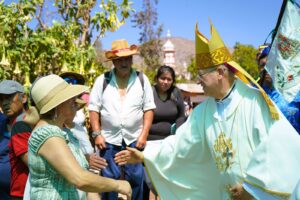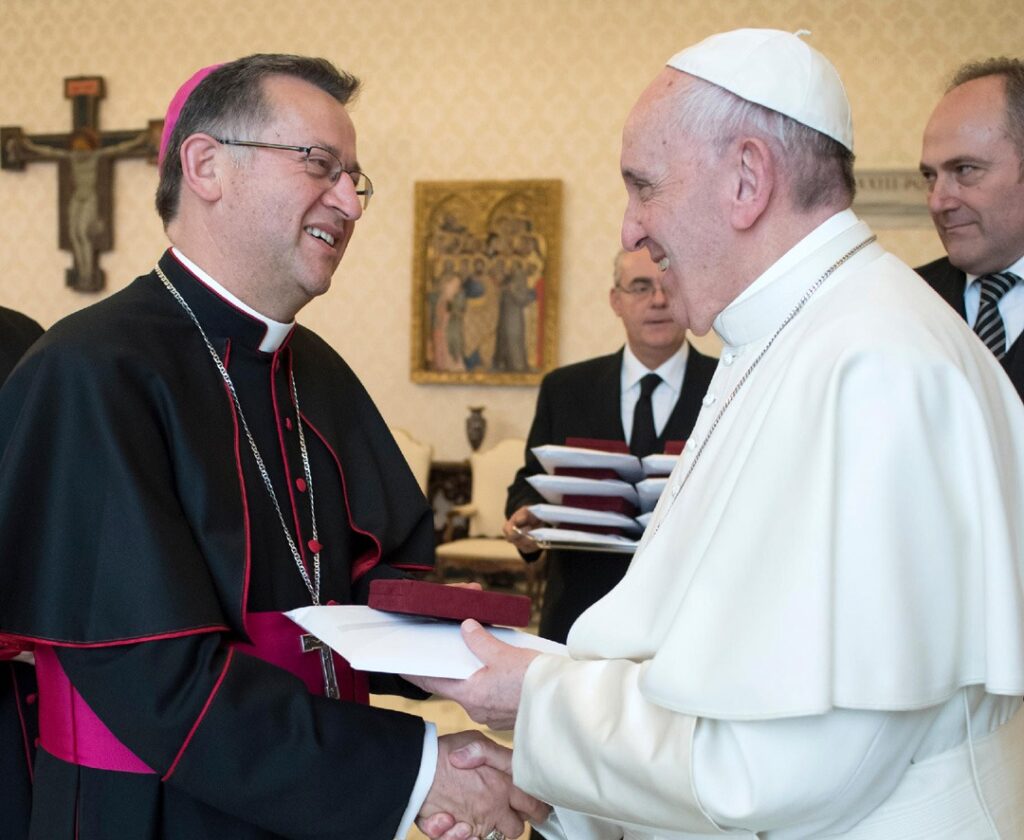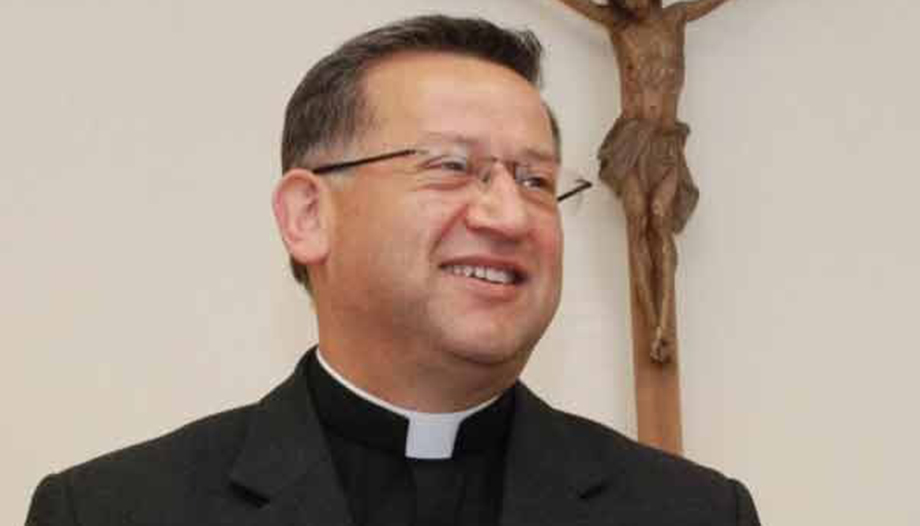Born in Cunco, Monsignor René Osvaldo Rebolledo Salinas will be the head of the Chilean episcopate for the next three renewable years. Monsignor Rebolledo was ordained a priest in 1984. His pastoral work began in the Immaculate Conception parish of LoncocheHe then moved to Italy to do his doctorate. Upon his return, he dedicated himself, in a special way, to formation at the San Fidel Major Seminary.
Seminary formation has been one of the major areas of his work, in fact, he presided over the Organization of Chilean Seminaries (OSCHI) and was part of the board of directors of the Latin American Organization of Seminaries (OSLAM). St. John Paul II appointed him Bishop of Osorno on May 8, 2004 and in 2013 Pope Francis appointed him Archbishop of La Serena. The newly elected president has granted an interview to Omnes in which he reflects on the need to promote vocation ministry or issues such as immigration.
In the recent Message from the Episcopal Conference of ChileAt the conclusion of the Plenary Assembly, the bishops expressed their concern about the shortage of vocations to the priesthood in Chile, and invited Catholics to intensify their prayers for this intention. What are the main causes of this notable drop in the last decade?
- There is a notorious advance in secularization in the country, with a progressive distancing of adults in general and young people in particular, from the ecclesial communities. To this must be added the institutional crisis that we have experienced at all levels due to situations of abuse.
However, in this area, I appreciate the serious work in prevention that has been carried out at the national level. Thousands of pastoral agents have been trained in all the ecclesiastical circumscriptions to serve in the installation of healthy and safe environments, as well as in the accompaniment of victims.
And what could be the initiatives to improve this urgent need?
- Above all, intensify our prayer. Aware of the great need for shepherds for our communities, we are invited to make our own the sentiments of Jesus, who "seeing the crowds, was moved with compassion for them, because they were harassed and helpless, like sheep without a shepherd" (Mt 9,36). To pay attention, also today, to what the Lord said to his disciples: "The harvest is plentiful, but the laborers are few". For this reason, to take on - with even greater perseverance - the imperative to "pray the Lord of the fields to send out laborers for his harvest" (Mt 9,37-38).
I have stated at various levels in the Archdiocese: "Prayer is the only instrument capable of acting at the same time in the field of grace and in that of freedom, allowing man to discern the call and respond to God. Nourished by the Word, it opens the heart of the believer to delve into the deepest truth of himself. In a journey of faith, prayer allows us to surrender ourselves to God's will and to give a generous response to a particular life project to which He is calling us".

In the same way, we should also take up the challenge - as St. John Paul II, Benedict and Francis invited us to do - of creating a "vocational culture" at every level, addressing some priority areas in this regard, such as: families and young people, altar servers and, in our milieu, the many young people involved in religious dances, among others.
In addition, at the request of the young people, the First National Youth Day (NYD 2025), from January 21 to 26, 2025, under the theme: "Young Pilgrims of Hope", in relation to the theme chosen for the Extraordinary Jubilee of the Redemption - 2025: Pilgrims of Hope. This meeting is inspired by the phrase of the Psalm119, 105: "Your Word is a lamp to my steps, a light to my path."
The prayer that the young people are praying in preparation for the First World Youth Day states that young people "are God's now" and asks the Lord that young people "pilgrims of hope, animated by the Spirit, help to renew the Church, and build a more just and supportive country, caring for the common home, embracing the poor and marginalized, being witnesses of the Lord's love".
I think that this NYY is a gift from the Lord. What is decisive is that the participants open their hearts to Christ who enchants life. In this way, this meeting can be a propitious opportunity to listen to his call.
Obviously, we bishops must face the challenge of the shortage of vocations with a great sense of co-responsibility together with the laity, consecrated men and women, deacons and priests".
In the Message, the Chilean bishops invite to welcome migrants to our country. The Catholic University Bicentennial Survey indicated that, in 2022, 82 % of Chileans considered the number of immigrants to be excessive. Moreover, due to the involvement of illegal immigrants who have committed serious crimes, there is a growing distrust of them by the citizenry. So, how to make this request of the bishops understandable to Chileans?
- A personal and community reflection is in order, which I express in synthesis: We are all migrants! This Homeland of ours is very beautiful, in various aspects, but it is not definitive. A significant percentage of Chilean men and women believe in God. Part of the believers profess the Catholic faith. Leaving one's own land and living as a foreigner goes back to the origins of the human race, as attested to in Sacred Scripture, as does the family life of our Lord. It is therefore necessary to contemplate the biblical witness.
On the other hand, to return the hand. In troubled times of our history, hundreds of Chilean men and women were welcomed in other latitudes, respected in their dignity and treated with appreciation.
It is not fair to link criminality and migration. In fact, thousands of migrants have arrived in our country with the desire for a better future for themselves and their families. They are contributing to the growth of the country and sharing in our communities their faith, their religious traditions and their hope.
Let us seek ways to help one another to build the earthly city in communion and co-responsibility, each one contributing with his or her gifts and the richness of his or her culture, but always aware that we are a pilgrim people. In this sense, I make my own the call of Pope Francis to to welcome, protect, promote and integrate migrantsThis also implies the proper accompaniment and support to the communities that have assumed the arrival of a large number of them, especially in border cities and large cities.
The aforementioned Survey shows that after the big drop in confidence in the Catholic Church in 2018, there has been a slow and steady improvement. Since that year, a greater silence from Catholic pastors has been noticeable. In your opinion, how much should public opinion influence the bishops to convey the Christian message?
- I am aware that we have expressed our opinion on various topics that are important to the country and to the Church. Of course, there are the Messages of the Assemblies of the Episcopal Conference of these years, as well as pronouncements on specific, pressing issues or special challenges. However, it is evident that many of these public words have gone unnoticed by the public in the face of the ecclesial crisis experienced and the consequent fall in confidence in the Church and its pastors.

In this sense, I think that, with a coherent and true witness of life of all the People of God, we will be able to attract others to Jesus Christ and his message. Likewise, being attentive and present in the reality of what people live, their sorrows and joys, will allow us to face the problems and difficulties, to seek together with others, ways of their solution, and thus move towards a path that allows society to trust again.
In March, Chile's main religious denominations - including Catholicism - expressed their concern about the deterioration of civic relations, the increase in insecurity, corruption and the inability of political actors to reach agreements. In view of this situation, they called for a national agreement to solve the serious problems facing the country. What are your expectations in this regard?
- A national agreement would be a privileged and urgent instance to face the great challenges we have as a country.
The common good calls us to act in a co-responsible manner in the face of the enormous challenges regarding the aforementioned issues - deteriorating civic relations, increasing insecurity, corruption, the inability of political actors to reach agreements, among others.
The greater good of the country demands that those who have been invested by the people as authorities be up to the task, placing the welfare of the people above electoral calculations.








